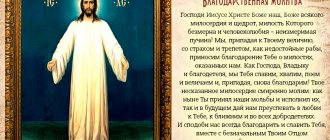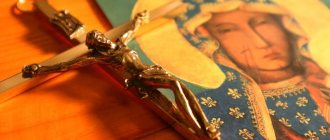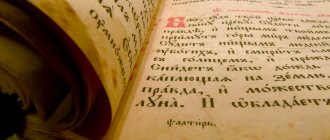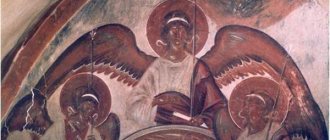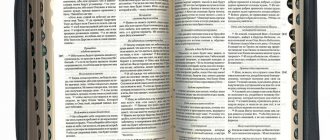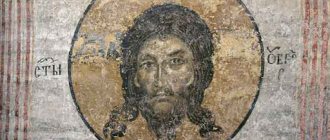The Lord's Prayer is known to many. Is it worth repeating over and over again? Or maybe there is some hidden meaning in it?
“It happened that when He was praying in one place and stopped, one of His disciples said to Him: Lord, teach us to pray, just as John taught his disciples.” (Luke 11:1)
The verb that is used twice in this place is “προσεύχομαι - proseukhomai”. Translated from Greek it means: “to pray, to pray, to ask in prayer.”
Prayer is the sacrament of our communication with God
While we can and should pray together, personal prayer is the foundation of our relationship with God. Trusting relationships can only be built through close communication: “When you pray, go into your room and, having shut your door, pray to your Father who is in secret; and your Father, who sees in secret, will reward you openly.” (Matthew 6:6)
Room, translated from Greek, means: “inner, secret room, treasury.” This is a place hidden from prying eyes. This is how Jesus Christ, in personal prayer to the Father, learned His will and did what God the Father wanted to do. “To this Jesus said: Verily, verily, I say unto you, The Son can do nothing of Himself, unless He sees the Father doing: for whatever He does, these the Son also does also. For the Father loves the Son and shows Him everything that He Himself does; and He will show Him greater works than these, so that you will be amazed.” (John 5:19-20)
Christ's earthly ministry is a manifestation of the things of God that they discussed together when Jesus prayed to the Father in private. It is in prayer that we receive an answer from God. Even if nothing happens right away, the peace of God fills our hearts in the presence of God: “Do not be anxious about anything, but in everything by prayer and supplication with thanksgiving let your requests be made known to God, and the peace of God, which surpasses all understanding, will guard your hearts and your thoughts in Christ Jesus." (Phil 4:6-7)
Anxiety is the scourge of the modern world
A comment!
All kinds of experiences keep a person in a state of stress, which causes illness and drives him into various addictions. Therefore, prayer is the most effective method of dealing with stress.
So the disciples ask Jesus to teach them to pray. And the Lord gives them a short but very capacious teaching: “Pray like this: “Our Father who art in heaven! Hallowed be Thy name; Thy kingdom come; Thy will be done on earth as it is in heaven; Give us this day our daily bread; and forgive us our debts, as we forgive our debtors; and lead us not into temptation, but deliver us from evil. For Yours is the kingdom and the power and the glory forever. Amen"." (Matt 6:9-13)
The texts of “Our Father” differ from each other in different sources
From the very beginning, there were several different interpretations of the Lord's Prayer. Even in the Gospels we find prayer in two versions: a more extensive one - from Matthew and a shorter one - from Luke. Moreover, in Matthew, the “Our Father” is part of the Sermon on the Mount, while in Luke, Jesus gives this prayer to his disciples in response to a request to “teach them to pray.” The first option is most widespread in Christianity. Biblical scholars, meanwhile, are not sure that the final phrase of the prayer (doxology) is “For Thine is the kingdom, and the power, and the glory, forever and ever. Amen” was generally included in the original text, since it is absent in the oldest versions of the Gospel of Matthew, and does not appear at all in Luke. There is a version that it began to be used only in early Christian times in liturgies. The texts in different languages also differ, since the translators apparently sought to highlight and make more significant certain aspects of the prayer.
The meaning of the Lord's Prayer
The first thing we see in the Lord's Prayer is the prayer plan. Jesus gave us point by point what we need to pray for. And each point, in itself, can become a topic for prayer to God. When I have some kind of need, it is better if I ask for exactly this than to even say the memorized prayer “Our Father” or another several times.
We most often pronounce memorized prayers automatically, but prayer from the heart will make our communication with God come alive.
The simpler and more sincere our prayer, the faster the answer comes.
Our Father:
- Jesus Christ teaches us to begin our prayers with thanksgiving, praise and worship: “Our Father who art in heaven! Hallowed be Thy name." Our praise touches the heart of God and prepares our hearts to ask in faith. From time to time, in this unjust world, we will be overcome by doubts and lack of faith. It is unbelief that is the main obstacle to accepting an answer from God: “And without faith it is impossible to please God; for he who comes to God must believe that He exists and is a rewarder of those who seek Him.” (Heb 11:6)
- Praise and worship are powerful weapons against unbelief and fear! Everyone knows that the song raises the morale of the army. Beginning our prayer with singing and thanksgiving, we literally lift up our spirit to God so that unbelief and fears recede.
- Prayer is the time and place to know the will of God and agree with it: “Thy kingdom come; Thy will be done on earth as it is in heaven.” Our desires, even good ones, may be outside the will of God. After all, God has prepared the best for us, which will not later bring pain, problems and disappointment: “But, as it is written: “Eye has not seen, nor ear heard, nor has it entered into the heart of man what God has prepared for those who love Him.” But God revealed this to us by His Spirit; for the Spirit searches all things, even the deep things of God.” (1 Cor 2:9-10).
Therefore, when coming to God in prayer, it is important to tune your heart to knowing and doing His will. - When we know the will of the Father, it is easier for us to reveal our needs to God: “Give us this day our daily bread.” Daily bread is all we need every day. This includes health, finances, wisdom, and success in business. The revelation of God's will gives the right direction for how we can pray for needs and desires.
- The time of prayer is the time of forgiveness: “And forgive us our debts, as we forgive our debtors.” When I accept forgiveness from God, it is easier for me to forgive my offenders. God's forgiveness cleanses the heart so that we can forgive as Jesus Christ forgave us: “But be kind to one another, compassionate, forgiving one another, just as God in Christ forgave you.” (Eph 4:32)
God in Christ has forgiven us forever. When I realize that I have been forgiven undeservedly, and that righteousness is a gift from God to all who believe, it is easier for me to forgive those who have sinned against me. We forgive by faith, and prayer helps us with this. - After being baptized in the Jordan and filled with the Holy Spirit, Jesus Christ was in the desert, where He was tempted by Satan. The Bible warns us that we too will be tempted by the devil. Therefore, Jesus teaches that in prayer we ask God for help: “And do not lead us into temptation, but deliver us from evil.” Our knowledge and will will not help against the devil and temptations. To win we need prayer and trust in God.
The Apostle Paul wrote to us that we defeat the devil’s wiles with the help of God’s weapons through various prayers: “Put on the whole armor of God, that you may be able to stand against the wiles of the devil, ... Pray with every prayer and supplication at all times in the Spirit, and be diligent about this with all your might.” perseverance and prayer for all the saints" (Eph 6:11,18)
At the same time, our prayers should not be based on our works, but on the victory of Jesus Christ. It is the victory of Jesus Christ on Calvary that gives me the right to boldly come to God and pray against the enemy: “Thanks be to God, who has given us the victory through our Lord Jesus Christ!” (1 Cor 15:57)
The Catholic version of the “Our Father” differs from the Orthodox one
In the Latin translation of the Bible (Vulgate), which was made from the Greek original by Blessed Jerome, the final words of the prayer were omitted: “For Thine is the kingdom and the power and the glory, forever and ever, Amen.” They were also omitted from Roman Catholic worship. This was explained by the fact that the Pope was considered the vicar of St. Peter and, as it were, the deputy of God on Earth, and all divine power was formally transferred to him.
It is interesting that members of the medieval Order of the Templars (Knights Templar) read the “Our Father” according to the canons not of the Catholic, but of the Eastern Christian (Greek Orthodox) liturgy, that is, with the preservation of the final words. It turned out that they denied the claims of the pontiffs to the divine Kingdom, power and glory. This became one of the reasons for the persecution of the Templars by the Inquisition.
Rescue Stories
Many Christian leaders say that reading the Lord's Prayer at the most terrible moments in life can help avoid a terrible fate. The main secret of this prayer is its power. God saved many people in danger by reciting the Lord's Prayer. Hopeless situations that put us in the face of death are the best moment to utter powerful lines.
One of the veterans of the Great Patriotic War, a certain Alexander, wrote a letter to his wife, which did not reach her. Apparently, it was lost because it was found in one of the troop locations. In it, the man said that he was surrounded by the Germans in 1944 and was awaiting his death at the hands of the enemy.
“I was lying in the house with a wounded leg, I heard the sound of footsteps and German conversation. I realized that I was going to die now. Ours were close, but it was simply ridiculous to count on them. I couldn't move - not only because I was wounded, but also because I was at a dead end. There was nothing left to do but pray. I was preparing to die at the hands of the enemy. They saw me - I was scared, but did not stop reading the prayer. The German did not have any cartridges - he began to quickly talk about something with his people, but something went wrong. They suddenly rushed to run, throwing a grenade at my feet so that I could not reach it. When I read the last line of the prayer, I realized that the grenade had not exploded.”
Read also: The Most Powerful Maternal Prayer of a Mother for her Daughter.
The world knows many such stories. Prayer saved people who met wolves in the forest - they turned around and walked away. The prayer put thieves and robbers on the righteous path, who returned stolen things, enclosing notes of repentance and that God had advised them to do this. This sacred text will save you from cold, fire, wind and from any misfortune that may threaten life.
But the main secret of this prayer is learned not only in grief. Read “Our Father” every day - and it will fill your life with light and goodness. Thank God with this prayer that you are alive. And you will always be healthy and happy.
“Give us this day our daily bread”
The third meaning: daily bread is the Body and Blood of the Lord, as different from the Word of God as the sun is from its rays.
In the Sacrament of the Divine Eucharist, the entire God-man, like the sun, enters, unites and becomes one with the whole person. It illuminates, enlightens and sanctifies all mental and physical powers and feelings of a person and leads him from corruption to incorruption. And it is precisely for this reason that we call our daily bread the Holy Communion of the Most Pure Body and Blood of our Lord Jesus Christ, for it supports and restrains the essence of the soul and strengthens it to fulfill the commandments of the Lord Christ and to any other virtue. And this is true food for both soul and body, for our Lord also says: “For My Flesh is truly food, and My Blood is truly drink.” If anyone doubts that the Body of our Lord is called our daily bread, let him listen to what the holy teachers of our Church say about this. And first of all, the luminary of Nyssa, the Divine Gregory, saying: “If a sinner comes to himself, like the prodigal son from the parable, if he desires the Divine food of his Father, if he returns to His rich meal, then he will enjoy this meal, where there is plenty the daily bread that feeds the Lord's workers. The workers are those who work and toil in His vineyard, in the hope of receiving wages in the Kingdom of Heaven.”
Saint Isidore of Pelusiot says: “The prayer that the Lord taught us does not contain anything earthly, but its entire content is heavenly and is aimed at spiritual benefit, even that which seems small and insignificant in the soul. Many wise people believe that the Lord wants to teach us with this prayer the meaning of the Divine Word and bread, which feeds the incorporeal soul, and in an incomprehensible way comes and unites with its essence. And that is why bread was called daily bread, because the very idea of essence is more suitable for the soul than for the body.”
Saint Cyril of Jerusalem also says: “Ordinary bread is not daily bread, but this holy bread (the Body and Blood of the Lord) is daily bread. And it is called essential, because it is communicated to your entire composition of soul and body.”
Saint Maximus the Confessor says: “If we adhere in life to the words of the Lord’s Prayer, then let us accept, as our daily bread, as vital food for our souls, but also for the preservation of everything that has been given to us by the Lord, the Son and the Word of God, for He said: “I am the bread that came down from heaven” and gives life to the world. And this happens in the soul of everyone who receives Communion, according to the righteousness and knowledge and wisdom that he possesses.”
Saint John of Damascus says: “This bread is the firstfruits of the bread to come, which is our daily bread. For the word daily means either the bread of the future, that is, the next century, or the bread eaten to preserve our being. Consequently, in both senses, the Body of the Lord will be equally appropriately called our daily bread.”
In addition, Saint Theophylact adds that “The Body of Christ is our daily bread, for whose uncondemned Communion we must pray.”
However, this does not mean that since the Holy Fathers consider the Body of Christ to be our daily bread, they do not consider ordinary bread necessary to support our body to be daily. For he too is the gift of God, and no food is considered contemptible and reprehensible, according to the Apostle, if it is accepted and eaten with thanksgiving: “Nothing is reprehensible if it is received with thanksgiving.”
Ordinary bread is incorrectly called daily bread, not according to its basic meaning, because it strengthens only the body, not the soul. Basically, however, and according to generally accepted opinion, we call the Body of the Lord and the Word of God our daily bread, for they strengthen both body and soul. Many holy men testify to this with their lives: for example, Moses, who fasted for forty days and nights without eating bodily food. The prophet Elijah also fasted for forty days. And later, after the incarnation of our Lord, many saints lived for a long time only on the Word of God and Holy Communion, without eating other food.
And therefore, we, who have been worthy of being reborn spiritually in the Sacrament of Holy Baptism, must continually receive this spiritual food with ardent love and a contrite heart, in order to live a spiritual life and remain invulnerable to the poison of the spiritual serpent - the devil. For even Adam, if he had eaten this food, would not have experienced the double death of both soul and body.
It is necessary to partake of this spiritual bread with due preparation, for our God is also called a burning fire. And therefore, only those who eat the Body of Christ and drink His Most Pure Blood with a clear conscience, having first sincerely confessed their sins, are cleansed, enlightened and sanctified by this bread. Woe, however, to those who receive communion unworthily, without first confessing their sins to the priest. For the Divine Eucharist burns them and completely corrupts their souls and bodies, as happened to the one who came to the wedding feast without a wedding garment, as the Gospel says, that is, without having done good deeds and not having fruits worthy of repentance.
People who listen to satanic songs, stupid conversations and useless chatter and other similar meaningless things become unworthy of listening to the word of God. The same applies to those who live in sin, for they cannot partake and partake of the immortal life to which the Divine Eucharist leads, for their spiritual powers are killed by the sting of sin. For it is obvious that both the members of our body and the containers of vital forces receive life from the soul, but if any of the members of the body begins to decompose or dry up, then life will no longer be able to flow into it, for the vital force does not flow into dead members. Likewise, the soul is alive as long as life force from God enters it. Having sinned and stopped accepting vital forces, she dies in agony. And after some time the body dies. And so the whole person perishes in eternal hell.
So, we talked about the third and final meaning of our daily bread, which is just as necessary and beneficial for us as Holy Baptism. And therefore it is necessary to regularly partake of the Divine Sacraments and accept with fear and love the daily bread that we ask in the Lord’s Prayer from our heavenly Father, as long as “this day” lasts.
“Give us this day our daily bread”
Bread is called daily bread in three senses.
And in order to know when we pray what kind of bread we ask from God and our Father, let us consider the meaning of each of these meanings. Firstly, we call daily bread ordinary bread, bodily food mixed with the bodily essence, so that our body grows and strengthens, and so that it does not die of hunger.
Consequently, meaning bread in this sense, we should not look for those foods that will give our body nourishment and sensuality, about which the Apostle James says: “You ask the Lord and do not receive, for you do not ask the Lord what is necessary, but what use it for your lusts." And in another place: “You lived luxuriously on earth and enjoyed; feed your hearts as for the day of slaughter.”
But our Lord says: “Take heed to yourselves, lest your hearts be burdened with overeating, drunkenness, and the cares of this life, and lest that day come upon you suddenly.”
And therefore, we should ask only the necessary food, for the Lord condescends to our human weakness and commands us to ask only for our daily bread, but not for excesses. If it were different, He would not have included the words “give us this day” in the main prayer. And St. John Chrysostom interprets this “today” as “always.” And therefore these words have a synoptic (overview) character.
Saint Maximus the Confessor calls the body a friend of the soul. The inflower instructs the soul so that it does not care about the body “with both feet.” That is, so that she would not care about him unnecessarily, but would only care with “one leg.” But this should happen rarely, so that, according to him, the body does not become satiated and rise up over the soul, and so that it does the same evil that demons, our enemies, do to us.
Let us listen to the Apostle Paul, who says: “Having food and clothing, let us be content with this. But those who want to get rich fall into temptation and into the devil’s snare, and into many foolish and harmful lusts that plunge people and lead them into disaster and destruction.”
Perhaps, however, some people think this way: since the Lord commands us to ask Him for the necessary food, I will sit idle and carefree, waiting for God to send me food.
We will answer in the same way that care and care are one thing, and work is another. Care is a distraction and agitation of the mind about many and excessive problems, while to work means to work, that is, to sow or labor in other human labors.
So, a person should not be overwhelmed by worries and cares and should not worry and darken his mind, but place all his hopes on God and entrust all his worries to Him, as the prophet David says: “Cast your sorrow on the Lord, and He will nourish you.” ”, that is, “Cast the care of your food on the Lord, and He will feed you.”
And he who places his hope most in the works of his own hands, or in the labors of himself and his neighbors, let him hear what the prophet Moses says in the Book of Deuteronomy: “He who walks on his hands and trusts and trusts in the works of his hands is unclean, and he He who falls into many worries and sorrows is also unclean. And the one who always walks on four is also unclean.”
And he walks both on his hands and on his feet, who places all his hopes on his hands, that is, on those deeds that his hands do, and on his skill, according to the words of St. Nilus of Sinai: “He walks on four who, having given himself up to matters of the senses, the dominant mind is constantly occupied with them. A multi-legged man is one who is surrounded by the body from everywhere and is based in everything on it and embraces it with both hands and with all his strength.”
The prophet Jeremiah says: “Cursed be the man who trusts in man and makes flesh his support, and whose heart withdraws from the Lord. Blessed is the man who trusts in the Lord, and whose hope is the Lord.”
People, why are we worrying in vain? The path of life is short, as both the prophet and king David say to the Lord: “Behold, Lord, You have made the days of my life so short that they are numbered on the fingers of one hand. And the composition of my nature is nothing before Your eternity. But not only me, but everything is in vain. Every person living in this world is vain. For a restless person does not live his life in reality, but life resembles his painted picture. And therefore he worries in vain and collects wealth. For he does not really know for whom he is collecting this wealth.”
Man, come to your senses. Don’t rush like crazy all day long with a thousand things to do. And at night again, do not sit down to calculate the devil’s interest and the like, for your whole life, in the end, passes through the accounts of Mammon, that is, in wealth that comes from injustice. And therefore you do not find even a little time to remember your sins and cry about them. Do you not hear the Lord telling us: “No one can serve two Lords.” “You cannot,” he says, “serve both God and Mammon.” For He wants to say that a person cannot serve two masters, and have a heart in God, and wealth in unrighteousness.
Have you not heard about the seed that fell among the thorns, that the thorns choked it, and that it did not bear any fruit? This means that the word of God fell on a man who was mired in worries and worries about his wealth, and this man did not bear any fruit of salvation. Don’t you see here and there rich people who have done something similar to you, that is, who have collected great wealth, but then the Lord breathed on their hands, and the wealth left their hands, and they lost everything, and with it their minds and Now they wander around the earth, overwhelmed by anger and demons. They received what they deserved, for they made wealth their God and applied their minds to it.
Hear, O man, what the Lord says to us: “Do not lay up for yourselves treasures on earth, where moth and rust destroy and where thieves break in and steal.” And you should not collect treasures here on earth, lest you hear from the Lord the same terrible words that He said to one rich man: “You fool, this night they will take your soul from you, and to whom will you leave everything that you have collected?” .
Let us come to our God and Father and cast all the worries about our lives on Him, and He will take care of us. As the Apostle Peter says: let us come to God, as the prophet calls us, saying: “Come to Him and be enlightened, and your faces will not be ashamed that you were left without help.”
This is how, with God’s help, we interpreted for you the first meaning of your daily bread.
Amulet for the whole family
This Orthodox prayer is extremely important, therefore it is the duty of parents to teach children from an early age to turn to God by saying the “Our Father” prayer. If you don’t have church literature at home, you can download the prayer in electronic form and learn to read it with emphasis on the necessary syllables.
Important! You should definitely explain to the children what the prayer is about and the history of its origin.
“Our Father” is not just a text to memorize, but also a powerful amulet.
It’s not for nothing that lines of prayer are written on the back of body icons that are hung around children’s necks at baptism. It will be good if you print out the sacred text on a piece of paper and place it in a visible place in the house. This way you will practically eliminate the possibility that you will forget to pray before going to bed. In addition, this item will drive away dark forces from the yard and remove all troubles from your home.
Interesting! We select the 3 most powerful prayers for good luck
You can read prayer not only in the morning and evening. By saying the text of the “Our Father” prayer in Russian in any life situation, you will feel a surge of strength and self-confidence. God never leaves his children and helps everyone who turns to him with faith.
“Give us this day our daily bread”
The second meaning: our daily bread is the Word of God, as Holy Scripture testifies: “Man shall not live by bread alone, but by every word that proceeds from the mouth of God.”
The Word of God is the teaching of the Holy Spirit, in other words, all of Holy Scripture. Both the Old Testament and the New. From this Holy Scripture, as from a source, the Holy Fathers and teachers of our Church drew, watering us with the pure spring waters of their God-inspired teaching. And therefore we must accept the books and teachings of the Holy Fathers as our daily bread, so that our soul does not die from hunger for the Word of life even before the body dies, as happened with Adam, who violated the commandment of God.
Those who do not want to listen to the Word of God and do not allow others to listen to it, either with their words or the bad example they set for others, and in a similar way, those who not only do not contribute to the creation of schools or other similar endeavors for the benefit of Christian children, but also repair obstacles to those who wish to help will inherit the words “Alas!” and “Woe to you!” addressed to the Pharisees. And also those priests who, through negligence, do not teach their parishioners everything that they need to know for salvation, and those bishops who not only do not teach their flock the commandments of God and everything necessary for their salvation, but through their unrighteous lives become a hindrance and a cause departure from the faith among ordinary Christians - and they will inherit “Alas!” and “Woe to you!”, addressed to the Pharisees and scribes, for they close the Kingdom of Heaven to people, and neither themselves enter into it, nor others - those who wish to enter - are allowed in. And therefore these people, as bad stewards, will lose the protection and love of the people.
In addition, teachers who teach Christian children must also instruct them and lead them to good morals, that is, to good morals. For what is the benefit if you teach a child to read and write and other philosophical sciences, but leave him with a corrupt disposition? How can all this benefit him? And what kind of success can this person achieve, either in spiritual matters or in worldly ones? Of course, none.
I say this so that God would not tell us those words that He spoke to the Jews through the mouth of the prophet Amos: “Behold, the days are coming, says the Lord God, when I will send a famine on the earth—not a famine of bread, not a thirst for water, but a thirst for hearing the words of the Lord." This punishment befell the Jews for their cruel and unyielding intentions. And therefore, so that the Lord does not say such words to us, and so that this terrible grief does not befall us, may we all awaken from the heavy sleep of negligence and be saturated with the words and teachings of God, each according to our own abilities, so that bitterness does not overtake our soul and eternal death.
This is the second meaning of daily bread, which is just as superior in importance to the first meaning as the life of the soul is more important and necessary than the life of the body.

